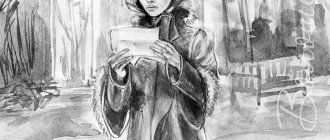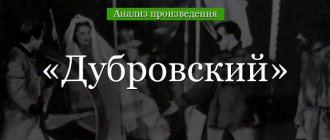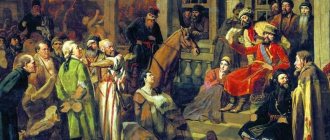Analysis of the poem “Poltava” by Pushkin
clause 1. Topics and problems
1. Topic:
The topic of military conflict. The work reflects a historical event - the Battle of Poltava.
Problem:
Difficult relations between military leaders, where faithful service is replaced by treason.
A picture of the battle unfolds before us. With great warmth, Pushkin describes the images of Russian soldiers whom Peter I leads into battle. The king is shown as strong, brave, powerful, with a fiery gaze. Reading the poem, you vividly imagine a battle that took place a long time ago. No historical chronicle can recreate the impression conveyed by a work of art, especially if the poem was written by a great author.
Pushkin talks about the difficult relationship that connected the Russian Tsar and his Hetman Mazepa. A faithful and devoted warrior suddenly goes over to the side of the enemy. Until the last minute, the king does not believe in Mazepa’s betrayal and rejects the denunciation. It is not easy to survive betrayal, especially if the future of the state is at stake. I think that you shouldn’t trust your close associate so recklessly, especially in government affairs.
The inner world of Mazepa is interesting to me. He fulfills his duties perfectly and serves the king faithfully. Suddenly Mazepa becomes a traitor. What prompted him to betray his sovereign? Surely, this is not a momentary feeling, but a long-standing plan that did not have the opportunity to manifest itself. He wants to see his country independent - a good desire. The only pity is that it seeks to be realized through deception. I can imagine what was going on in the soul of a man who served Peter for so many years and cherished the hope of overthrowing him.
2. Topic:
Theme of love.
Problem:
Love can be blind, overly trusting and reckless.
Maria loves Mazepa - a wonderful feeling, but why take such a difficult path. At the moment of matchmaking, she does not talk about her passionate desire to marry the hetman. Who knows how her parents would have taken her sincere confession? What if they relented and gave their blessing to their marriage? She doesn't even try to talk to them. The girl disappears, unaware that she is causing injury to her powerful and proud father.
Maria gets involved in a serious conflict. Her mind is not yet strong enough to perceive the harsh truth of life. Unable to bear the death of her father, which she also provoked, the girl goes crazy. For her, Mazepa, her lover, in whom she sees both a terrible and a beautiful image, remained incomprehensible. Maria could not fit this duality into her head.
3. Topic:
Revenge.
Problem:
The desire for revenge turns against the avenger.
The fact of his daughter's disappearance becomes a serious test for Kochubey. He has a distorted perception of what happened. Maria ran away to Mazepa of her own free will, but, for some reason, her father believes that the girl’s honor has been violated. Of course, here we are talking about ancient times when such events were perceived differently. Imagine Kochubey, who was deceived by his daughter. He was also deceived by a close friend, to whom he entrusted the role of godfather. Kochubey seeks revenge, but instead loses his own head. I think that this situation could have been resolved peacefully.
Izmailov N.V.: Pushkin at work on “Poltava”.
PUSHKIN AT WORK ON “POLTAVA”1
““Habent sua fata libelli.”* The most mature of all my poetic stories, the one in which everything is almost original (and this is all we strive for, although this is not the main thing), “Poltava,” which Zhukovsky, Gnedich, Delvig and Vyazemsky prefer everything that I have written so far; “Poltava” was not a success...”
“Having read these verses for the first time in Voinarovsky:
The wife of the sufferer Kochubey and their seduced daughter,**
I was amazed how the poet could pass by such a terrible circumstance. Burdening historical characters with fictional horrors is neither wise nor generous. Slander in poems has always seemed uncommendable to me. But in describing Mazepa, missing such a striking historical feature was even more unforgivable. However, what a disgusting object! not a single kind, supportive feeling! not a single consoling feature! temptation, enmity, betrayal, deceit, cowardice, ferocity... I wrote “Poltava” in a few days, I could not have worked on it any longer, and I would have given up everything.”1
These remarks by Pushkin about his poem, intended for publication, and partly published during his lifetime, that is, deeply and completely thought out, expressed in a finished form and pursuing certain goals as a response to critics of the poem, also indicate the path to its study; they introduce the history of the creation of “Poltava”, clarify its genesis, its place in Pushkin’s work and in contemporary literature, and finally (which is especially important) give the poet’s own judgment about its meaning and place in his work, in a word, they are the key to her understanding.
Speaking about the fact that he wrote “Poltava” “in a few days” (or, in the draft text: “ a.
per week
b.
in 2 weeks" - XI, 405), Pushkin was - of course, deliberately - not entirely accurate. The main part of the poem was, indeed, written with extraordinary speed: it took about three weeks to create, revise and rewrite three quarters of the first canto, almost the entire second and the entire third - in total up to 1250 verses out of a total of 1470 (approximately) verses in the entire poems. The first song, mostly written and completed at the end of September 1828, was rewritten in full on October 3, the second was written (not completely) and rewritten by October 9, the third was completed by correspondence by October 16.2
“April 5” (V, 175),3 and the analysis of “Poltava” itself and its sources forces us to push back the search for its roots for many years - to the time of Pushkin’s stay in Southern Russia. Let us recall a number of facts relevant here.
Pushkin spent the years of his childhood and youth in an era full of grandiose historical events and revolutions - in the era of the Napoleonic Wars, the Patriotic War of 1812 and European campaigns, followed by a period of intense struggle between the monarchical reaction and the national and national forces awakened by the French Revolution and the struggle of peoples against Napoleon democratic revolutionary forces. In Russia, these years - after the end of the European campaigns in 1815 - were a time of growing internal crisis of the serfdom system, a time of awakening of public consciousness, the emergence and development of secret revolutionary organizations of the advanced nobility, preparing the uprising of December 14. Before Pushkin’s eyes, Russian and world history was created and flowed rapidly. He could not help but ask questions about the origin, causes and course of historical events - and the natural attraction of an inquisitive mind to comprehend the history of mankind naturally deepened and acquired very early defined forms, where research, political and artistic interests merged into one whole.
The publication in 1818 of the first eight volumes of Karamzin’s “History of the Russian State” gave a powerful impetus to the development of Pushkin’s historical interests. We see reflections of “History,” which he read “with greed and attention” immediately after leaving (XII, 305),4 in the last songs of “Ruslan and Lyudmila” - especially in the description of the struggle of the Kievans with the Pechenegs in the sixth song of the poem (verses 244— 320, etc.), written in 1819-1820. Later, already in southern exile, living in Chisinau in close acquaintance with the poet, historian and political figure Vl. F. Raevsky, visiting Kamenka and Tulchin, the centers of the Southern secret society, being in constant communication with many of its members - future Decembrists, Pushkin again and again, following his historical interests and thoughts, the influence of Decembrist ideology, turned to topics from Russian history. The Decembrists were looking in the past for the lost ideals of Russian freedom and analogies to their aspirations - Pushkin responded with an epilogue to the “Prisoner of the Caucasus”, attempts to work out the theme of Vadim Novgorod, the idea of a poem about Mstislav and Ilya Muromets, “The Song of the Prophetic Oleg.”5 Pushkin in “The Prisoner of the Caucasus” " and "Bakhchisarai Fountain". But his interest in Russian history continued to develop in its own way. Under the influence of Decembrist ideas, under the influence of the growth of the revolutionary movement in Russia and the West, which forced us to peer into the patterns of historical processes and look for the roots of modernity in the recent past, Pushkin turned to the consideration of Russian history of the 18th century; the result of this is the well-known historical notes dated August 2, 1822 - the most harsh, almost pamphlet-like description of the activities of the 18th-century sovereigns, the successors of Peter I, especially Catherine II. These reflections naturally led to the personality and political activity of Peter, whose, in Pushkin’s words, “revolution” gave a new direction to Russian history until the beginning of the 19th century. With brief, but strong and sharp features, Pushkin draws here Peter - a “strong man” of an “extraordinary soul”, a “northern giant”, an inspired builder of a “transformed state”, and at the same time a despot, around whom reigned “universal slavery”, “all trembled, everything silently obeyed.” “Peter I,” the poet concluded his reasoning, “was not afraid of people’s freedom, the inevitable consequence of enlightenment, for he trusted his power and despised humanity, perhaps more than Napoleon” (XI, 14). These condensed formulas, as if carved on copper, already contain – in embryonic form – Pushkin’s later dual, or rather, two-sided view of the personality and activities of Peter, which found its full expression in his “History” and especially in “The Bronze Horseman”.
Pushkin’s interest in the Peter the Great era was expressed in the trip he took with I.P. Liprandi at the beginning of 1824 from Odessa to Bendery in order to find traces of the camp of Charles XII and the grave of Hetman Mazepa.6 And, perhaps, it was in Bendery, on the almost disappeared the remnants of the Swedish camp, in a vain search for the forgotten ge, the poet (in the words of the draft to the epilogue of “Poltava” - V, 307) for the first time imagined his future poem in vague outlines. But the time has not yet come for her. It was necessary to overcome the fascination with subjective romanticism, finish “Gypsy”, create a tragedy drawn from Karamzin’s “History” and having as its theme an earlier political crisis in the history of Russia - the struggle for the throne at the end of the 16th - beginning of the 17th century. and the participation of the masses in it; it was necessary to become familiar with Decembrist historical and political poetry - with the Dumas and poems of Ryleev, in order to push away from them, from their romantic pseudo-historicism, and to contrast them with our own understanding of the historical poem as a special genre, equally distant from the traditional classicist epic and from ahistorical individualism romantic, Byronian type story; it was finally necessary to survive December 14 in order to reconsider one’s ideological positions, to determine one’s view of the Russian historical process, the significance of Peter’s reforms and to find analogies for them in modern times; one had to study Peter’s era much more deeply, recognize it from primary sources and make an attempt - unfinished and which could not yet be finished - to give a picture of Peter the Great’s time in a “family” historical novel about the “blackamoor of Peter the Great” - Ibrahim. Pushkin had to experience and do all this in order to make it possible to create not only a real-poetic, but also a real-historical image of the critical days of Peter the Great’s era, in other words, to write “Poltava.”
The poem was created on the basis of a careful, although inevitably one-sided, study of the Peter the Great era. It had to be one-sided because authentic archival materials, the study of which in the 30s significantly complicated and deepened Pushkin’s ideas about the personality and activities of Peter, were unknown and inaccessible to him at the time of the creation of Poltava, and he used printed historical works, mostly of a panegyric or official nature, Russian and foreign. Based on them and supplementing with the brilliant intuition of a poet-historian, he built his concept of the historical era, his understanding of the characters of its main figures - Peter and Charles XII, Mazepa and Kochubey - and the significance of their activities for the future of the “northern power”, in a word, the concept that found expression in the epilogue of the poem.
the tragic love of Kochubey's daughter for Hetman Mazepa. Having deviated in it from some historical facts, but in full agreement with the psychology of the heroes and the character of the historical era, Pushkin created in “Poltava” a truly historical poem, fundamentally realistic, where every historical fact, every detail in the activities of historical heroes can be confirmed by documentary evidence. sources, and the characters, feelings and thoughts of these heroes, expressed in their speeches, stem not from the subjective intentions of the poet, but from a deep and correct understanding of the era and from the general historical concept thought out by him. Pushkin had every reason to resolutely defend Poltava from accusations of violating historical truth. He could rightfully write that “Mazepa acts in my poem exactly as in history, and his speeches explain his historical character” (XI, 164; cf. XI, 158).
The author especially insisted on “Poltava” - both in the preface to the poem and in his response to critics’ comments, written in the fall of 1830. The critics themselves, to whom he objected, analyzed the poem primarily from the point of view of its compliance or non-compliance with historical truth. An article by M. A. Maksimovich7 was devoted to the same issue - undoubtedly the most serious of all the critical articles about “Poltava” contemporary to Pushkin. These circumstances not only give us a basis, but oblige us, before talking about the plan and history of the creation of “Poltava,” to consider the historical sources on which it is based and which were in the hands of the poet at the time of its creation.
| Part: 1 Notes |
Forward




